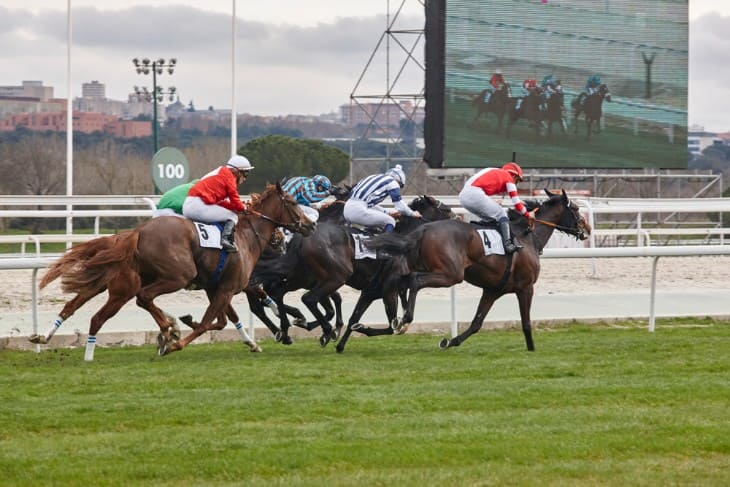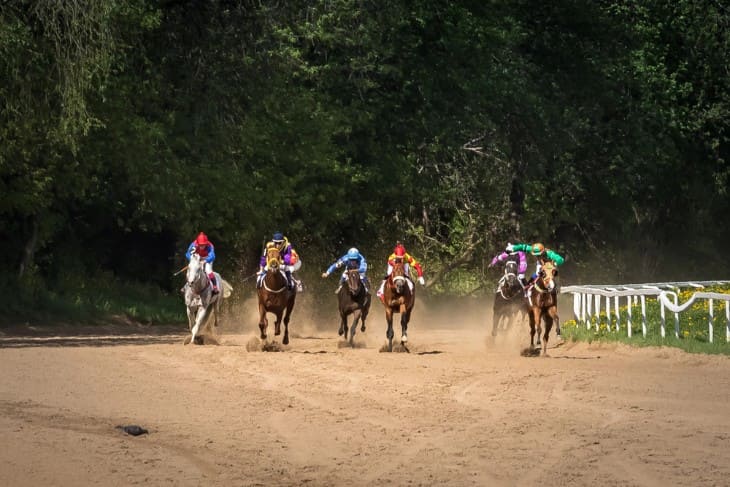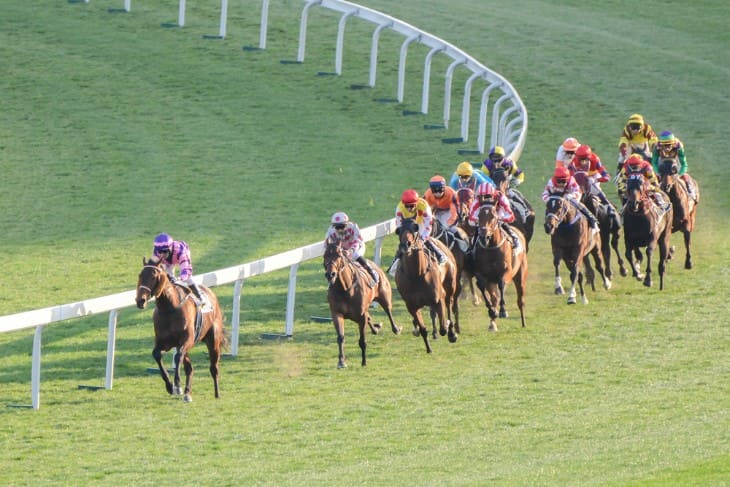- Introduction
- Course Records as Benchmark for Excellence
- Course Records and Comparative Analysis
- Historical Significance of Course Records
- Course Records and Evaluation of Track Conditions
- Attraction for Fans and Spectators
- Course Racing as a Valuable Marketing Tool
- Prestige for Horses and Jockeys
- Course Records and Betting Considerations
- Summary
Introduction
Course records in horse racing are the fastest times ever recorded for a specific distance on a particular racetrack. They serve as benchmarks of excellence, representing the pinnacle of speed and performance achieved by horses and jockeys. These records are highly specific, taking into account the unique characteristics of each racetrack, such as its surface type (dirt, turf, synthetic) and configuration. By breaking or closely approaching a course record, a horse not only demonstrates its exceptional ability but also sets a historical standard for future competitors to aspire to.
These records have historical significance and contribute to the lore and tradition of horse racing. They often date back many years, and breaking a long-standing course record can become a memorable moment in the sport's history. Course records are also valuable tools for bettors, trainers, and enthusiasts, providing a basis for comparative analysis when assessing a horse's chances in a race. Overall, course records are a crucial aspect of horse racing, serving as a measure of excellence and a source of inspiration for those involved in the sport. And, in this short article, we will take a little deeper look, to check their importance from different aspects.
Course Records as Benchmark for Excellence
The concept of "Benchmark for Excellence" in horse racing refers to the establishment of a standard of performance that represents the highest level of achievement for a specific distance on a particular racetrack. Course records serve as these benchmarks, providing a clear measurement of what is considered the best possible performance under given conditions. Horses that break course records or come close to doing so are often regarded as exceptional and are celebrated for their speed, stamina, and racing prowess.
Breaking a course record is a remarkable feat because it demonstrates that a horse and jockey partnership have not only mastered the intricacies of a particular track but have also pushed the boundaries of what is considered possible in horse racing. These records set a level of excellence that future competitors aim to surpass, driving a constant pursuit of improvement and performance enhancement in the sport. When a horse achieves a course record, it signifies that they have reached the zenith of their abilities, and their name becomes etched in the annals of horse racing history.
Moreover, the benchmark for excellence provided by course records goes beyond the individual horse's achievement. It becomes a reference point for evaluating the overall quality of a race or a generation of horses. Races that feature several horses nearing or breaking course records are often viewed as highly competitive and thrilling, as they showcase the best that the sport has to offer. In essence, course records not only celebrate individual accomplishments but also elevate the standards of horse racing as a whole, making them an integral part of the sport's heritage.
Course Records and Comparative Analysis
Course records play a vital role in comparative analysis within horse racing. They serve as a valuable tool for bettors, handicappers, trainers, and enthusiasts alike when assessing a horse's chances in a race. Comparative analysis involves evaluating how a horse's performance in a particular race measures up to historical standards set by previous champions who have established course records. By examining the time it takes for a horse to complete a specific distance on a given racetrack, one can gain insights into the horse's current form and capabilities.
For bettors, comparing a horse's performance to the course record can be a crucial factor in making informed wagers. A horse that consistently runs close to or breaks course records may be seen as having a competitive advantage, especially if the conditions on race day are favourable. Conversely, a horse that consistently falls far short of the course record may be considered less likely to win or place in a race, unless there are other mitigating factors at play.
Trainers and owners also use course records for comparative analysis to assess their horse's potential and set realistic expectations. They may consider a horse's performance relative to the course record when deciding which races to enter or how to prepare for a particular competition. In essence, course records provide a historical context that allows stakeholders in horse racing to gauge a horse's abilities and make strategic decisions in the sport.
Historical Significance of Course Records
The historical significance of course records in horse racing cannot be overstated. These records represent not just moments of excellence but also chapters in the rich history of the sport. Many course records date back decades or even a century, and breaking or setting a new record is often a noteworthy event that adds to the lore and tradition of horse racing.
When a horse breaks a long-standing course record, it becomes a part of the sport's history books. It's a moment that enthusiasts and historians cherish because it marks a new pinnacle in racing speed and performance. These records are like milestones in the evolution of the sport, highlighting the improvements in training, breeding, and racing strategies over the years. They also serve as a testament to the enduring legacy of great horses and jockeys who have graced the tracks in the past.
Course records, particularly those that have stood for a significant period, create a sense of continuity in the sport. They allow fans and participants to connect with the past, fostering a sense of nostalgia and respect for the traditions of horse racing. Horses that break such records are often remembered and celebrated for generations to come, ensuring that their names and achievements remain an integral part of the sport's historical fabric. In essence, course records are not just statistics; they are a living testament to the enduring and evolving legacy of horse racing.

Course Records and Evaluation of Track Conditions
Course records in horse racing also play a crucial role in evaluating track conditions. The time it takes for a horse to complete a specific distance can be influenced by various factors, including the state of the racetrack. Therefore, course records offer insights into the track's condition on the day the record was set.
If a horse breaks a course record, it suggests that the track was in exceptional condition that day, possibly due to favourable weather, meticulous maintenance, or other factors. Conversely, if a horse falls short of the course record but still runs a competitive time, it may indicate that the track conditions were not as favourable, possibly due to rain, wind, or wear and tear. Trainers and jockeys closely analyze these records to gauge how much the track conditions may have affected a horse's performance in the past, helping them make informed decisions on race day.
Additionally, course records can also serve as a reference for track officials and maintenance crews. Racecourse management may strive to maintain or improve track conditions to replicate the circumstances under which course records were set, as these conditions are generally considered ideal for racing. This can lead to investments in track maintenance, drainage systems, and other infrastructure to create consistently fast and safe racing surfaces. In this way, course records not only reflect track conditions but can also drive efforts to enhance the quality and consistency of racing tracks.
Attraction for Fans and Spectators
Course records hold a special appeal for horse racing fans and spectators, adding an exciting dimension to the sport. When a horse is on the verge of breaking a course record or does so in a thrilling race, it creates an electrifying atmosphere at the track. Fans and spectators are drawn to these moments of potential history-making, and the anticipation of witnessing a record-breaking performance can significantly boost attendance and viewership at race events.
The pursuit of course records also gives fans a shared narrative and a sense of continuity in the sport. They can compare today's horses and jockeys with legendary champions from the past who set these records. It becomes a source of conversation, debate, and nostalgia among fans, further enhancing their engagement with the sport. The potential for a course record to be broken adds an element of unpredictability and excitement to horse racing, making it more than just a competition but a thrilling spectacle for spectators.
Course records often create lasting memories for fans and spectators. Witnessing a horse and jockey partnership break a long-standing record can become a cherished moment in a racing enthusiast's life. These records serve as historical milestones that fans can look back on with pride, connecting them to the rich history and tradition of horse racing. In essence, course records enhance the overall attraction of horse racing by infusing it with moments of drama, excitement, and historical significance that captivate the hearts of fans and spectators alike.
Course Racing as a Valuable Marketing Tool
Course records also serve as a valuable marketing tool for race tracks and organizers. When a track boasts a prestigious course record, it becomes a selling point to attract top-tier horses, jockeys, and trainers to compete in their events. The presence of course records can elevate a track's reputation, positioning it as a venue where horses have historically performed exceptionally well. This reputation, in turn, can help draw larger crowds and generate more excitement around the races.
Promoting the fact that a track holds a course record can also be a strategic marketing move. It can be used in advertising and promotions to highlight the track's unique attributes, emphasizing its potential for record-breaking performances. This marketing strategy not only appeals to racing enthusiasts but also piques the interest of casual fans and newcomers to the sport, making them more likely to attend events and engage with horse racing.
Furthermore, course records can be part of the branding and identity of a race track. They become a symbol of excellence and a source of pride for the local community and racing industry. Tracks often host events or races specifically designed to challenge these records, creating anticipation and excitement among fans. In this way, course records become more than just statistics; they become a dynamic and marketable aspect of the horse racing experience, enhancing the overall appeal of the sport.

Prestige for Horses and Jockeys
When a horse breaks a course record, it signifies an exceptional level of speed, stamina, and performance. This achievement can elevate the horse's reputation and marketability, making it a sought-after contender in high-profile races and potentially increasing its breeding value. Horses that hold course records become part of the sport's history, their names forever associated with excellence.
For jockeys, guiding a horse to break a course record is a remarkable feat that showcases their skill, expertise, and strategic acumen. It can solidify their status as top-tier riders and attract opportunities to partner with leading trainers and horse owners. Jockeys who consistently achieve record-breaking performances become household names in the racing community, and their achievements are celebrated by fans and fellow professionals alike. The prestige of breaking course records can open doors to new riding opportunities and enhance a jockey's career.
The prestige associated with course records also extends beyond individual races. Jockeys and horses that repeatedly set or break course records contribute to the overall allure and excitement of horse racing. Their performances inspire fans, driving interest and engagement in the sport. This, in turn, can lead to increased attendance at race events and higher viewership on television and online platforms. Ultimately, the prestige associated with course records adds to the enduring appeal of horse racing as a whole, making it a dynamic and captivating spectacle for both participants and spectators.
Course Records and Betting Considerations
For bettors and handicappers, analyzing how a horse's performance in a race compares to the established course record is a key aspect of form assessment. A horse that breaks or comes close to breaking a course record can be seen as having a competitive advantage, especially if the conditions on race day are similar to those when the record was set. This knowledge can influence betting decisions, as such horses are often viewed as strong contenders.
Conversely, if a horse consistently falls short of the course record by a significant margin, it may raise concerns about its ability to perform at the highest level. While there can be various factors affecting a horse's performance, including competition and track conditions, a significant disparity from the course record can be a red flag for some bettors. They may choose to wager on other horses they believe have a better chance of winning based on their proximity to the course record.
In addition to individual horse assessment, course records can also impact betting markets in terms of odds and payouts. Horses that are considered course record contenders may have shorter odds, reflecting the higher expectations for their performance. Conversely, horses that are deemed unlikely to challenge the course record may have longer odds, potentially offering higher payouts if they manage to outperform expectations. Thus, course records serve as a critical factor for bettors in evaluating the competitiveness of a race and making strategic wagers.
Summary
Course records in horse racing are records of the fastest times ever achieved by horses over specific distances on particular racetracks. They are highly specific to each track and distance combination and serve as benchmarks for excellence in the sport. These records have historical significance, dating back many years, and breaking or setting a new record is a celebrated achievement that adds to the tradition of horse racing. Course records are essential for comparative analysis, helping bettors, trainers, and enthusiasts assess a horse's performance in relation to historical standards. They also serve as valuable marketing tools for race tracks, enhance the prestige of horses and jockeys, and influence betting considerations by indicating a horse's competitiveness based on its proximity to the record.
For more information:








